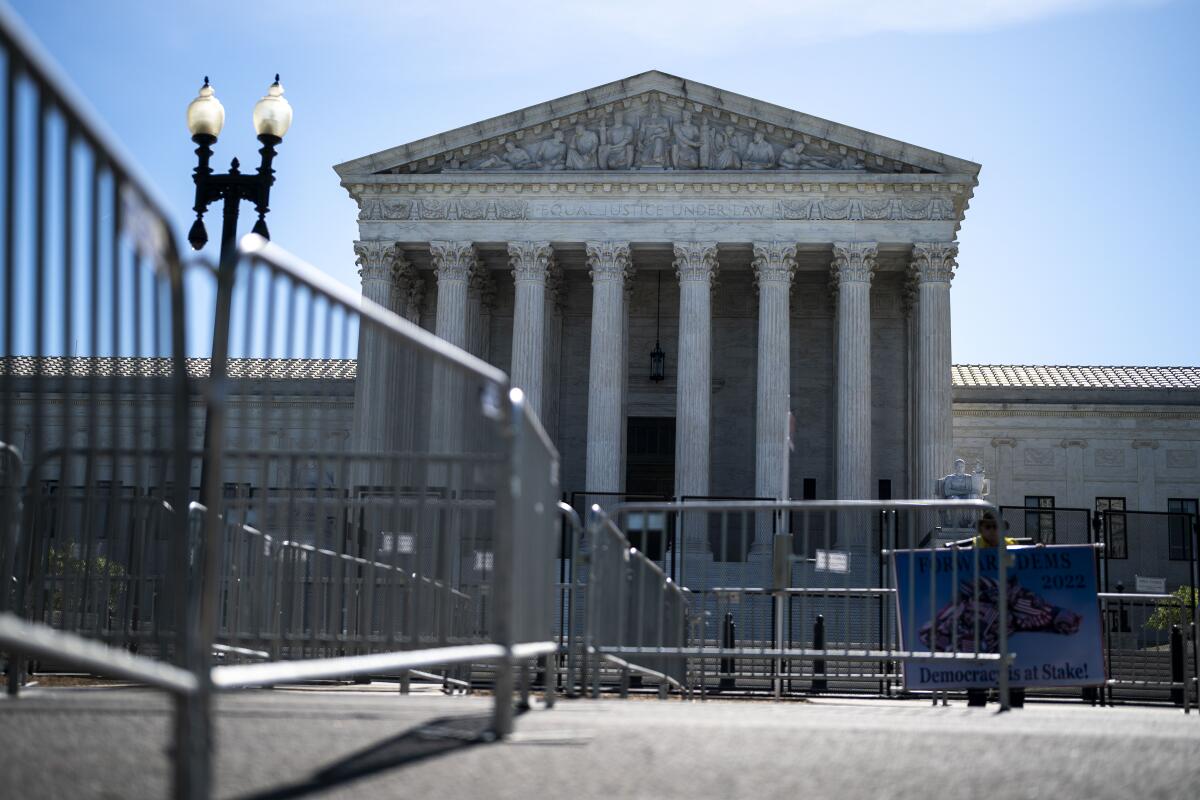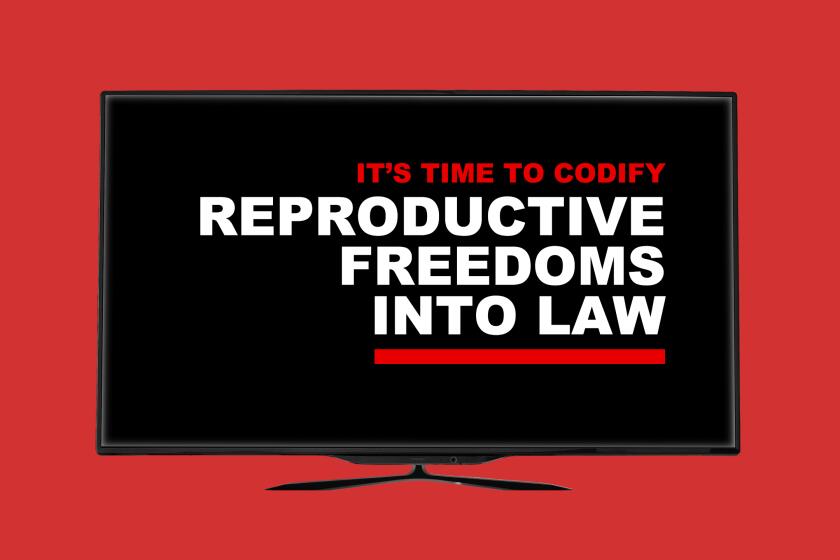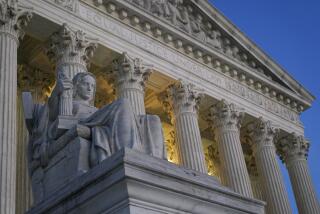Supreme Court’s pending abortion ruling: What it may mean

A look at three common beliefs about the justices’ expected ruling on Roe vs. Wade.
- Share via
WASHINGTON — The leaked Supreme Court draft opinion overruling Roe vs. Wade set off a political firestorm about the future of abortion.
The February draft, written by Justice Samuel A. Alito Jr., would free states to prohibit almost all abortions, except possibly to save the life of the mother.
If the draft becomes a final decision next month, abortion will no longer be a legal right nationwide, but instead will turn on partisan politics in each state.
In advance of the ruling, there’s been plenty of discussion about its implications. Here are three examples of commonly heard speculation, and why the reality is more complicated:
After the court overturns Roe, it could move to restrict same-sex marriage and contraception.
While possible, this is unlikely.
It’s true that Alito writes in the draft that the court should recognize new rights only if they are spelled out in the Constitution or “deeply rooted” in the nation’s history and tradition. That formulation would cast doubt on recent liberal rulings, including the 2015 decision that made gay marriage legal nationwide.
In his draft, Alito tried to put to rest the fears that other rights are now in danger, and he may well have needed to do so to win the votes of Justices Brett M. Kavanaugh and Amy Coney Barrett.
First, abortion is a “unique act,” Alito said, because it “destroys ... the life of an ‘unborn human being,’” quoting the lawyers for Mississippi in the pending case. Past rulings involving marriage and contraception are “fundamentally different,” he said, because no one is harmed by them.
Second, he said the justices should overturn past decisions only if they have been shown to be unworkable and divisive, and he argued that Roe vs. Wade had “inflamed” the battle over abortion rather than resolved it.
As evidence, he noted that lawyers for 26 states had urged the court to overturn the right to abortion.
By contrast, the decision in Obergefell vs. Hodges to uphold the right to same-sex marriage appears to have resolved the political divide over that issue. Public opinion polls show an overwhelming majority now supports same-sex marriage, and no state is seeking to overturn it.
“Nothing in this opinion should be understood to cast doubt on precedents that do not concern abortion,” Alito wrote.
Even so, advocates for LGBTQ rights have reason to be skeptical. The court’s conservatives are likely to uphold claims from religious conservatives who say they should not be required to participate in same-sex weddings even if their state’s law requires businesses to provide full and equal services to LGBTQ customers.
The justices were split on that issue in 2018 in the Masterpiece Cakeshop case, and they have agreed to hear another Colorado case on the issue this fall. A ruling in favor of the business owner would be a setback for LGBTQ rights, but its impact would be limited.
Abortion political ads are everywhere you look after Roe vs. Wade leak
President Trump’s nominees lied about their abortion views in confirmation hearings, some say.
That’s not correct, but the justices — like virtually all Supreme Court nominees in modern history — did give vague answers and engage in wordplay that may have allowed senators to hear what they wanted to.
Ever since the Senate voted in 1987 against confirming Judge Robert Bork, Supreme Court nominees have refused to discuss their views on the most disputed issues before the court — and none has been more disputed than abortion.
In this odd dynamic, White House lawyers vet and select nominees who they believe will vote reliably on the president’s side on major issues. Then the nominees go before the Senate and assert they are open-minded jurists who have no fixed views and will seek to follow the law.
Trump promised to nominate potential justices who would vote to overturn Roe vs. Wade, and his White House lawyers screened candidates with that aim in mind. When questioned by senators, Kavanaugh and Neil M. Gorsuch said they would not discuss questions that might come before the court.
But when asked about abortion, both men spoke of the importance of precedents and the doctrine of “stare decisis,” or standing by what had already been decided. These past rulings are entitled to respect, they said.
At hearings and during private meetings with lawmakers, both referred to Roe as “settled law” and “settled precedent.” But such terms in reality are vague and meaningless, since they simply acknowledge the existence of a past Supreme Court decision.
Neither Kavanaugh nor Gorsuch promised the Senate Judiciary Committee that they would not vote to overturn those precedents. But what they said apparently was enough to prevent two female GOP senators who support abortion rights from opposing their nominations.
From the moment Amy Coney Barrett was nominated, she was widely believed to be a vote to overturn Roe. During her confirmation hearing, she acknowledged her personal opposition to abortion, but vowed to separate her views from any legal case before her.
The court could rule for Mississippi in the pending abortion case without overturning Roe vs. Wade.
That is possible, but very unlikely. It depends on Kavanaugh.
During oral arguments in December on the Mississippi abortion law, Chief Justice John G. Roberts Jr. stood alone in seeming to advocate for a narrow ruling focused solely on upholding the state’s 15-week limit on abortions, and leaving Roe at least partially intact.
While Alito’s draft reflected the views of the five most conservative justices, Roberts’ friends and former clerks suggest he has drafted a separate opinion, seeking to win over one or more votes.
The justices follow an internal rule that calls for draft opinions in all pending cases to be circulated in May so others can respond or prepare dissents.
If Kavanaugh or one of the other conservatives were to join with the chief justice, Roberts could issue a middle-ground opinion that ruled for Mississippi but did not overturn Roe. In such a case, the court’s three liberals presumably would join in an effort to moderate the ruling.
But Kavanaugh has sent no signals that he is interested in such a cautious approach. In the fall, he and Barrett repeatedly refused to join the chief justice to put a Texas abortion law on hold even though it made most abortions illegal.
If none of the others agree with Roberts, he could write a separate opinion that concurs with the outcome; he has opposed Roe in the past. It’s also possible that he’ll sign on to Alito’s opinion to overturn Roe, making it a 6-3 ruling.
More to Read
Get the L.A. Times Politics newsletter
Deeply reported insights into legislation, politics and policy from Sacramento, Washington and beyond. In your inbox three times per week.
You may occasionally receive promotional content from the Los Angeles Times.












